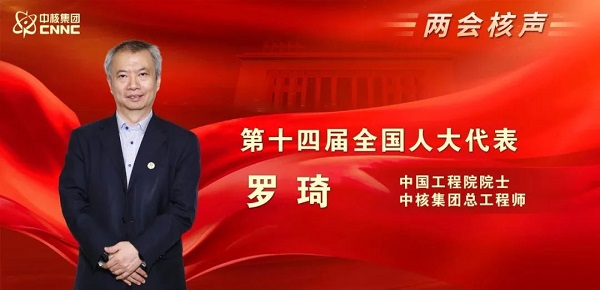Luo Qi: Accelerate the Development of New Quality Productive Forces and Push for Industrial Innovation with Sci-tech Innovation
"We are currently in the fourth industrial revolution, whose key is intelligent development and clean energy. It is of vital importance to promote the formation of new quality productive forces through the innovation of nuclear technology in driving the development of clean energy, which is also a central element in the cultivation of the fifth industrial revolution, " said Luo Qi, chief engineer of China National Nuclear Corporation (CNNC), at an interview.

Luo added that it is the mission and responsibility of nuclear technology workers to strive for revolutionary breakthroughs in nuclear technology, speed up the application of major engineering technologies, and implement a three-step national nuclear energy development strategy for the building of new quality productive forces.
Strengthen the implementation of the country's three-step development strategy of nuclear energy
"The development of nuclear energy bears great importance to the country's strategic and energy security. It is an industrial foundation for the development of the nuclear sector," said Luo. He emphasized that the development strategies for nuclear technology innovation are driving forces for nuclear energy development. It is thus of utmost importance for China to advance the implementation of the three-step nuclear energy development strategy, which range from the building of thermal reactors to the building of fast and fusion reactors in holding strategic height. It is also an internal requirements for the development of the country's nuclear industry.
During the past years, China has stepped up the implementation of its three-step nuclear energy development strategy, undertaken a series of major technological innovation and engineering projects with numerous achievements, and further enhanced its innovative competitiveness in nuclear technology.
Luo noted that China should coordinate and devote its all forces and resources to making breakthroughs in nuclear fusion technologies and gaining strategic sovereignty. He went on to say that there are already fertile conditions for the country to accelerate the implementation of its three-step nuclear energy development strategy against the backdrop that the world is at a critical moment in the development of nuclear energy.
According to him, firstly, the country should push for the implementation of its three-step nuclear energy development strategy with solid results, strive for a global leader in nuclear technology innovation. Secondly, the country should build consensus among all stakeholders, make it clear top-level planning, and promote the building of core projects. Thirdly, the country should highlight the importance of the three-step nuclear energy development strategy in the overall national strategy, and formulate forward-looking, comprehensive, authoritative and operational development plans with specific targets, paths and major points in guaranteeing the long-term development of its nuclear energy. Lastly, the country should make its laws for nuclear energy development to provide the development of nuclear technology with reliable and solid legal support.
Technological innovation bears utmost importance
Noting that it is of great significance to strengthen basic research in nuclear technology in the further implementation of the three-step nuclear energy development strategy, Luo said that basic research is a driving force for the development of new quality productive forces, represents a country's technology innovation prowess, and is a vital carrier to make breakthroughs in core technologies and nurture new technologies as well as economic growth points.
Nuclear technology innovation, which is an integral component of a country's science and technology with strategic importance, highly depends on the development and breakthroughs of basic research. The speed and height of the development of China's nuclear industry is closely related to its basic research capabilities in the nuclear sector. Therefore, the building of a comprehensive and strong basic research system in the nuclear industry will sustain the fast development of nuclear technology.
China has basically built a comprehensive nuclear technology innovation system, which consists of the implementation of a number of major sci-tech innovation projects represented by Hualong One nuclear technology, since it launched its nuclear industry in 1950s. However, there are still some weak points in the development of its basic research capabilities and layouts. The basic research of nuclear technology should adapt to and lead a new round of technological revolution and industrial transformation, support the development such strategic new industries as new materials, new energy and nuclear medicine, usher new frontiers for the development of fusion-related energy, inject new vitality into traditional industries, and accelerate transformation as well as upgrading pace.
Luo came up with a three-point proposal. Firstly, the country should accelerate the building of its nuclear technology innovation system, and create world-class nuclear technology innovation facilities and scientific apparatus. Secondly, the country should further improve its policy support for the building of large-scale basic research platforms, establish policy support systems applicable to research result identification, procedure appraisal and personnel training, stimulate the innovation vitality and willingness of basic research workers, and make full use of the efficacy of basic research platforms. Thirdly, the country should adhere to the development principles that underscore major points, orderly progress and efficacy, beep up investment to basic research institutions, guide and encourage researchers to focus on their work with stable financial support, and yield major sci-tech breakthroughs.
- China Institute of Atomic Energy
- Nuclear Power Institute of China
- Southwestern Institute of Physics
- China Nuclear Power Operation Technology Corporation, Ltd.
- China Nuclear Power Engineering Co., Ltd.
- China Institute for Radiation Protection
- Beijing Research Institute of Uranium Geology (BRIUG)
- China Institute of Nuclear Industry Strategy (CINIS)
- China Nuclear Mining Science and Technology Corporation


